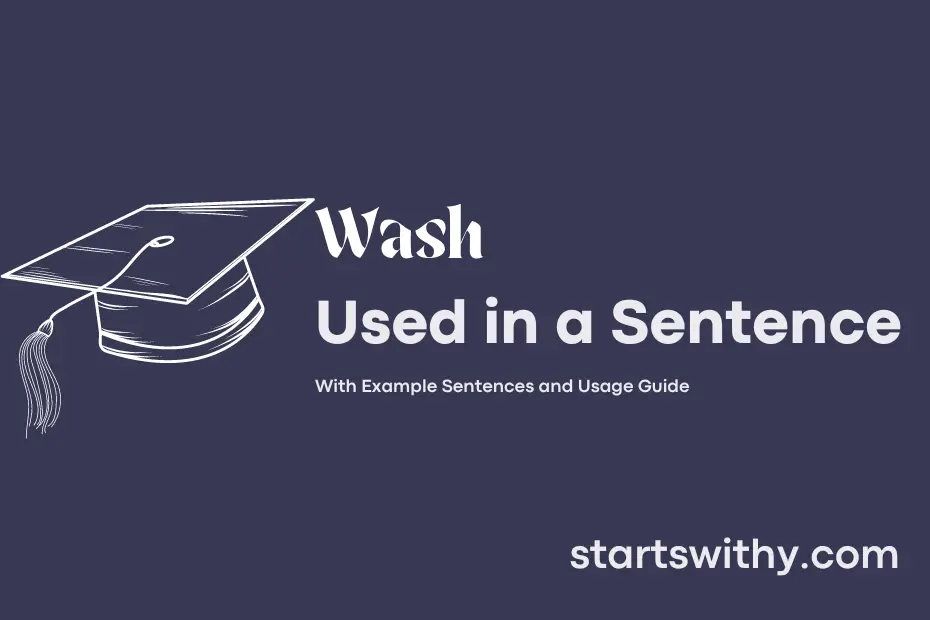Everyday tasks like cleaning and maintaining personal hygiene are an essential part of our routine. One common activity we all engage in is washing. Washing involves the use of water and often soap to cleanse surfaces, objects, or our bodies from dirt, grime, or bacteria.
Whether you’re washing dishes, washing your hands, or washing your car, this simple action plays a vital role in keeping things clean and maintaining good hygiene. Let’s explore the various ways washing can benefit us in our daily lives.
7 Examples Of Wash Used In a Sentence For Kids
- Wash your hands before eating.
- Always wash fruits before eating them.
- Remember to wash your face before bedtime.
- It is important to wash vegetables before cooking.
- Wash your hands after playing outside.
- Don’t forget to wash your plate after eating.
- Let’s wash our clothes together.
14 Sentences with Wash Examples
- Wash your hands thoroughly before and after eating to prevent the spread of germs.
- Remember to wash your water bottle regularly to avoid bacteria buildup.
- It’s important to wash your clothes on a regular basis to maintain hygiene.
- Don’t forget to wash your face every night before going to bed to remove dirt and oil.
- Make sure to wash your fruits and vegetables before consuming them to remove pesticides.
- Wash your dishes promptly after meals to prevent pests and odors in your dorm room.
- Always wash your gym clothes after a workout session to avoid any lingering sweat odors.
- It’s a good practice to wash your reusable shopping bags to prevent cross-contamination of items.
- Remember to wash your hands before entering the chemistry lab to ensure safety.
- Wash your hair regularly to maintain scalp health and cleanliness.
- Ensure to wash your bedding regularly to prevent dust mites and allergies.
- Don’t forget to wash your face masks after each use to maintain cleanliness.
- Remember to wash your hands with soap and water during the ongoing pandemic to prevent the spread of viruses.
- It’s important to wash your hands before and after using shared computers to prevent the spread of germs.
How To Use Wash in Sentences?
To use the word “wash” in a sentence, follow these steps:
-
Identify the context: Think about how “wash” is being used in the sentence – Is it referring to cleaning something, or a specific action such as a person washing their hands or clothes?
-
Subject-Verb Agreement: Make sure that the form of the word “wash” matches the subject in your sentence. In present tense, it is “wash” for singular subjects (e.g. I wash my car) and “washes” for third person singular subjects (e.g. She washes her hair).
-
Add Objects: To make your sentence more descriptive, you can include objects that are being washed. For example, “I wash my dishes every night” or “She washes her dog in the bathtub”.
-
Verb Tenses: Consider using different verb tenses with the word “wash” to indicate when the action is taking place. For instance, “I washed my car yesterday” (past tense) or “He will wash the windows tomorrow” (future tense).
-
Grammar Rules: Pay attention to other grammar rules that apply when using “wash” in a sentence, such as punctuation and word order.
By following these steps and practicing with different sentence structures, you will become more comfortable and confident in using the word “wash” effectively in your writing.
Conclusion
In conclusion, the examples of sentences using the keyword “wash” demonstrate the diverse ways in which the word can be used in different contexts. From describing the act of cleansing something with water and soap to discussing the colors or fabric care instructions of clothing, “wash” is a versatile word that plays a crucial role in our day-to-day communication. Additionally, the word can also be used figuratively to convey actions like concealing or purifying.
These varied examples showcase the importance and flexibility of the word “wash” in the English language, highlighting its ability to convey a range of meanings and concepts. Whether used in a literal or metaphorical sense, “wash” remains a fundamental term that enriches our language and communication.



